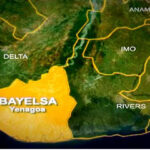This week, Nigeria received some reprieve. Some 25,000 metric tonnes of wheat are being donated by the World Food Programme (WFP) to help curb hunger in the country’s northeast. This development has sparked debates, not because it is uncommon for nations to donate to other countries in need, but because Ukraine, a country at war with Russia since 2022, is donating food to a country like Nigeria that is not at war. Technically.
However, when considering the casualty rates in the northeast and other areas where Nigerian troops are battling organised violent groups, it can be argued that Nigeria is effectively engaged in an intrastate war. The security situations and ungoverned spaces that the Nigerian state has allowed have been overrun by bandits and terrorists. Our national integrity and the safety of the lives and property in these spaces are not the only things that have suffered. Our collective food security has too.
A recent report by SB Morgen, the Lagos-based intelligence service, farmers in the Northwest region alone have had to shell out N39 million in levies to bandits just to access their own farmlands. Countless farming communities have been displaced over the years. These alongside the inflation rates that have seen prices soar like Elon Musk’s rocket headed for space create a recipe for anarchy.
Already, signs of this impending anarchy have started manifesting. Last week, some irate residents of Zaria waylaid a BUA truck carrying noodles and looted the payload. This happened in broad daylight. There might have been a dispute over pricing issues that served as a trigger. But that is only a trigger. The real reason for the mob action is simply that people are hungry, food is expensive and people do not have the resources to feed their families.
Unfortunately, the chaos witnessed in Zaria could be the beginning of a mobocracy unless the Nigerian authorities take immediate action. This week, mobs looted warehouses in Abuja, not only taking food but anything they could sell for profit. The situation in Nigeria is increasingly worrisome.
It is logical for the government to feel compelled to act urgently. Their plan is to distribute 42,000 MT of grains to the people and purchase an additional 62,000 MT from rice millers for distribution. This intervention is temporary, but it raises the question of how we arrived at this point and what steps we should take next. Well, we got here because of several factors. The most obvious is the inflation that has driven prices up. For this, the government, both this one and its predecessors, must take responsibility. The previous government for its profligacy and poor economic decisions, and this one for its unscripted policy changes. This panic button that the FG is pushing now would not have been necessary if before withdrawing subsidy and floating the naira, the government had considered the long and short-term effects on the economy and consequently on the people and had taken measures first, for a staggered implementation and second, to, as we say in Nigeria, cushion the effects. As I already mentioned, the insecurity is also a major contributor to this.
So, should Nigeria be embarrassed that it is receiving food aid from a country in the throes of fending off an occupation? Honestly, yes. We should be, as a country, extending aid to people in crisis or facing genocide, like the Palestinians. But with our millions of displaced persons from too many internal conflicts, it would seem unlikely at the moment. As the Hausa proverb says, if the hyena can cure diarrhoea, let it cure itself first before offering it to others.
Another question that arises is, considering our propensity to misappropriate things, what do we do with this food from Ukraine and ensure it gets to those it was intended for? Well, the grains are going to the World Food Programme (WFP), an agency of the United Nations, which plans to combine the wheat donation with cash and other commodities to distribute to approximately 1.3 million crisis-affected people in the region for a two-month period. From that perspective, it would seem that Nigerians can rest assured that the food will reach the people who need it the most.
The scepticism is drawn from our experience not too long ago when the Saudi government, in 2017, donated 200 tonnes of dates for the country’s displaced persons. The dates ended up in the open market, being sold to people who did not need them. The person responsible for overseeing that scandal, Mrs. Sadiya Farouq, who was the Federal Commissioner of the National Commission for Refugees, Migrants, and Internally Displaced Persons (NCFRMI) at the time, was rewarded with a powerful ministerial position two years later. In January of this year, she was detained and then released by the Economic and Financial Crimes Commission. The reason? Alleged corrupt practices in the handling of the N37.1 billion social investment fund, for which she is still being investigated. Our proclivity to reward corruption at the expense of our desperate populace has a long history. Similarly, we have antecedents as recently as 2020 when public officials hoarded palliatives meant for needy Nigerians to alleviate the impact of the COVID-19 lockdown. As we say, no be today. So where do we go from here? Well, according to the World Food Programme, Nigeria is in its fourth consecutive year of chronic food insecurity. According to projections, 26.5 million Nigerians will face acute hunger during June and August of this year.
From all perspectives, this is not good. So, the government must take urgent measures to address our food security and come up with strategic initiatives to ensure that this is our last year of food insecurity. The ancient Egyptians had a seven-year famine. We certainly do not want to match that record.
To avoid this, emphasis must be placed on securing the country’s farmlands so farmers can tend to their crops. It doesn’t matter what loans and fertiliser subsidies the government offers if farmlands remain inaccessible; this crisis will continue. The perennial clashes between farmers and herders need to be decisively addressed, urgently and at once.
This donation from Ukraine, kind and generous as it is, should be a motivation for Nigeria never again to be in a position where Africa’s largest economy would be in a position to receive food aid, not just from a war-ravaged country but from any country, period.

 Join Daily Trust WhatsApp Community For Quick Access To News and Happenings Around You.
Join Daily Trust WhatsApp Community For Quick Access To News and Happenings Around You.


